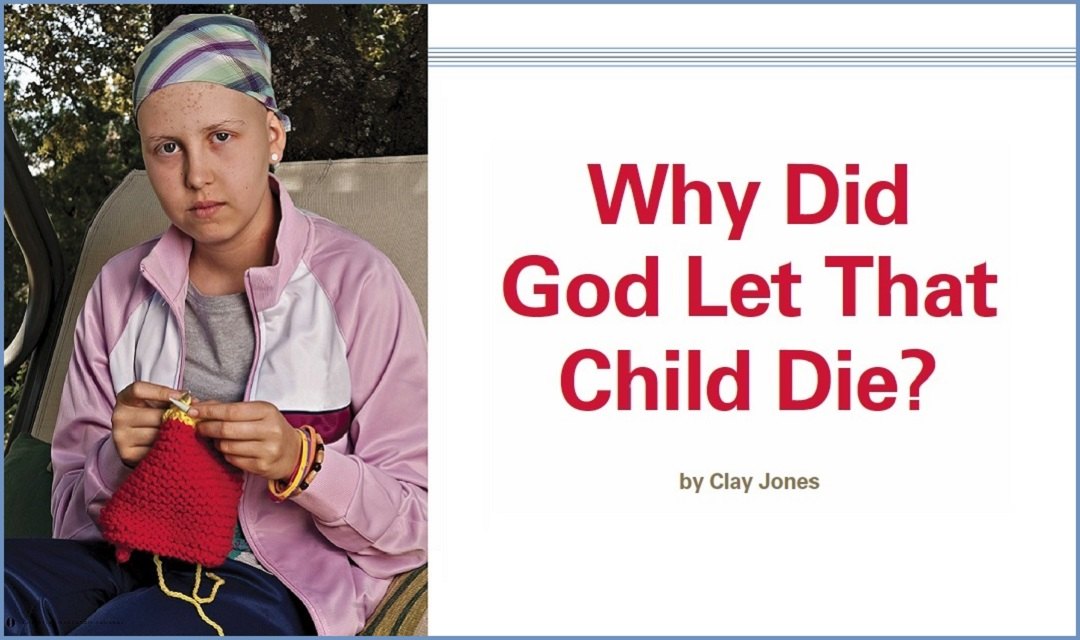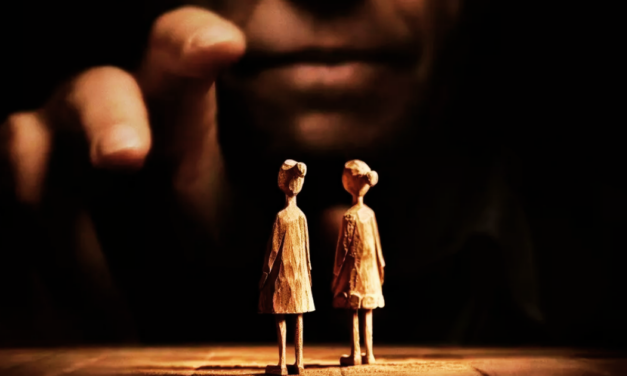This article first appeared in the Christian Research Journal, volume 38, number 01 (2015). The full text of this article in PDF format can be obtained by clicking here. For more information about the Christian Research Journal click here.
Perhaps the most difficult and emotionally charged question ever asked the pastor or apologist is why God let a particular child suffer or die. The question is rarely abstract. I’ve never been asked why God lets children die. I’m asked why God let six-year-old Ethan get killed by a car while he was skateboarding or why God let four-year-old Kaylee die of leukemia. The typical Christian answer is, “We won’t know until we get to heaven.” Of course, we will certainly know more when we get to heaven, but is that all we can answer? I suggest we know more than that. We may not know all of God’s reasons for letting a particular child die at a particular moment, but we can answer why God allows children to die.
Note that this article isn’t directed toward those who have just lost a child. My wife, Jean, and I experienced five miscarriages, which led to our never having children and we know firsthand what it is like to have Christians try to “solve” grief.1 Those who grieve rarely search for explanations of how God works in the universe. Instead, they need hugs and maybe meals. The Scripture tells us to “weep with those who weep” (Rom. 12:15). But there comes a time, when the initial anguish subsides, that people seek the larger picture of what God is doing in the universe.
WHAT CAUSES CHILDREN TO SUFFER AND DIE?
Children suffer and die due to three main causes. First, children suffer and die due to pestilence and disease enabled when the Lord cursed the ground after Adam and Eve sinned. He banished Adam and Eve from the Garden of Eden, thus barring humans from the rejuvenating power of the Tree of Life. God warned Adam and Eve that if they ate from the Tree of the Knowledge of Good and Evil, “you will surely die” (Gen. 2:17), and He didn’t add “at a ripe old age of natural causes.” He just said, “You will surely die,” and we’ve been attending funerals ever since. Second, children also suffer and die because of the mistakes and sins of others, such as leaving a pool gate unsecured, drunk driving, murder, and so on. Third, children suffer and die because natural laws work in regular ways: the gravity that keeps us on planet Earth also enables fatal falls; the fire that warms also burns; the water in which we swim can also drown.
Disease, sins, and consistent natural laws, then, are the main reasons that children die. That brings us to the question, why doesn’t God afford children special protection?
THE IMPORTANCE OF OUR HUMILITY
Although I said above that we can do more than just say, “We’ll find out in heaven,” that doesn’t mean that humility isn’t a part of our answer! It is. After all, since we don’t know what we don’t know, especially in such circumstances, how we judge the meaning and significance of a situation requires giving God the benefit of the doubt. That’s where humility and faith play their parts.
I must say, however, that every Christian I have ever known who has suffered a severe loss, and remained faithful, in time understands how God has used that suffering for good. There is an “already, not yet” aspect to our understanding. I expect that in kingdom come we’ll fully understand God’s greater purpose.
That said, we can go beyond just, “We’ll find out in heaven,” so let’s look first at why free will requires God’s hiddenness and what role that plays in the answer to why God lets children die.
THE NECESSITY OF FREE WILL AND GOD’S HIDDENNESS
In Matthew 12:38–39, when some of the “scribes and Pharisees” told Jesus, “Teacher, we wish to see a sign from you,” He answered, “An evil and adulterous generation seeks for a sign, but no sign will be given to it except the sign of the prophet Jonah,” by which He referred to His resurrection. Because the Lord doesn’t want to interfere with our free will, He gives enough evidence of His existence so that those who want to believe will have their beliefs justified, but not so much evidence that those who don’t want to believe will be forced to feign loyalty. Oxford philosopher Richard Swinburne puts this in perspective:
If God is to allow us to acquire knowledge by learning from experience and above all to allow us to choose whether to acquire knowledge at all or even to allow us to have a very well-justified knowledge of the consequences of our actions—knowledge which we need if we are to have a free and efficacious choice between good and bad—he needs to provide natural evils occurring in regular ways in consequence of natural processes. Or rather, he needs to do this if he is not to give us too evident an awareness of his presence.2
Isaiah wrote, “Truly, you are a God who hides himself, O God of Israel, the Savior” (Isa. 45:15). A miracle-filled world diminishes the significance of our actions and compels the rebel to feign allegiance.
THE PROBLEM WITH CHILDHOOD INDESTRUCTIBILITY
For those who wish God would afford children with more protection, the problem arises as to exactly how God would keep bad things from happening to children without displaying millions of miracles every day.
I’ve had this kind of conversation many times, and it typically goes like this. Someone asks whether God was unfair for letting Kaylee die from leukemia. I respond, “But it’s not just Kaylee that you’re concerned about, right? I mean, you don’t think God should let any child die of cancer, right?” They always agree to this point. After all, you’d have to be a selfish swine to say that you only cared if one child died of cancer and not others. Then I point out that it’s not just cancer, right? I mean, you don’t think children should die of other horrible diseases, right? They always agree to this too. Then I ask, but it’s not just disease, right? You don’t think God should let children drown, or be crushed by boulders, or burn in fires, or be murdered, right? They always agree. But then I point out that it isn’t just death, right? After all, you don’t think children should be maimed or raped, right? They always agree. So finally, I ask, well, if all this is true, if children shouldn’t be able to suffer being raped or maimed, or to die from murder, accident, or disease, then to what age do you think children should be indestructible?
At this most start laughing because they realize the absurdity of indestructible children. In fact, when you change the question from why God allowed a particular child to die to why God allows children to die, the question almost answers itself.
But rarely someone gives ages. One woman blurted out, “Twelve.” But this quickly falls apart. After all, she didn’t really think it would be okay for God to let thirteen-year-olds be raped or die from murder, accident, or disease, did she? Is it any different for the seventeen-year-old? Wouldn’t those who argue that children should be indestructible until a certain age still accuse God of unfairness?
But perhaps the biggest problem with indestructible children regards the mechanism required to keep these children from being seriously injured or killed. Again, God couldn’t do tens of thousands of miracles every day without causing those who don’t want to worship Him to feign loyalty.
Also, a child’s actions wouldn’t mean much. For example, Johnny could be cutting his steak next to his little brother Jimmy and suddenly jam his knife into Jimmy’s side and God could make the knife turn to rubber. The whole family could laugh heartily—but that’s a cartoon world.3 In such a world, we could encourage our kids to go play marbles in the freeway: “You’ll just bounce around a lot.” In such a world, children wouldn’t learn morality because many of their choices would lack moral consequences.
Now, I suspect the more serious answer will be that God should every day orchestrate tens of thousands of providential occurrences to protect children. But if God constantly worked through providences, then God would still have to interfere constantly with free will. For example, how does God prevent parents from getting drunk, or texting, or nodding off, while driving? How does God providentially keep all children everywhere at all times from the fatal occurrences that might afflict other family members? How would God providentially keep all children from being harmed by the intentional cruelty of adults? He couldn’t do all these things unless He was to make Himself unmistakably apparent. After all, even the most dull-witted person would conclude, sooner or later, that there’s something about the universe that prevents children from coming to harm. In the real world, parents and their children must learn to be responsible because natural laws do work in regular ways.
And suffering has other benefits.
WHAT GOOD MIGHT ARISE FROM A WORLD IN WHICH CHILDREN DIE?
Many important spiritual lessons are learned from the suffering and/or death of children—courage, patience, compassion, selflessness, humility, and so on—but I’m going to focus on perhaps the most important. From the death of children, whether other people’s children or our own, we learn that we can never base our ultimate happiness on this world. The American Dream—that we can have our kids grow up, graduate, achieve successful careers, marry great spouses, and have wonderful children, and through whose children, and children’s children, we can gain a sense of immortality—is forever in danger. There is nothing worldly that we can count on, including what most people love most: their children. Instead, we must look to God for our ultimate and eternal fulfillment.
Only worshippers of God can accept this. We shouldn’t expect those who only live for this life not to bitterly complain that God is unfair for threatening what to them is supremely valuable and their best chance for a semblance of immortality.
Suffering can be valuable for children, too. As a child, rheumatic fever damaged my heart and caused my parents and doctors to fear for my life. But I thank God for that because it gave me a strong sense of my own mortality, which has benefited me spiritually ever since!
WHAT IS THE ETERNAL DESTINY OF CHILDREN WHO DIE?
Although Christians differ about this, many Christians have argued that all who die before the age of accountability (see Deut. 1:39) will be saved.4 They base this on verses such as Luke 18:16–17, where Jesus said, “Permit the children to come to Me, and do not hinder them, for the kingdom of God belongs to such as these. Truly I say to you, whoever does not receive the kingdom of God like a child shall not enter it at all” (Luke 18:16–17 NASB). As theologian Millard Erickson asks, “Could it be that Jesus was using as the object lesson in his plea for a certain quality, individuals who did not actually embody that quality? That would seem strange indeed. Thus, if Jesus was affirming that those who would enter into the kingdom must be like these children, he seems to be asserting, as a premise in his argument, that these children were in the kingdom.”5
Regarding infants, Christopher W. Morgan and Robert A. Peterson point out, “Although their reasons might differ depending on other theological commitments, and although some of their reasons are better than others, evangelicals generally agree that [deceased infants] will be in heaven.”6
It’s true that no Scripture unambiguously guarantees that children will be saved, but if they are, God would have good reason for not unambiguously making that clear, for then abortion and infanticide would guarantee a child’s salvation! Imagine the abuses that would occur from that knowledge! Whatever the case, we can rest in God’s love and mercy regarding their fate.
Some consider the fact that God allows children to suffer or die to be an indictment of His character. But when we look at the problems of a world in which children cannot be injured or die, we glimpse the bigger picture of what God is doing to prepare humans for eternal life. We can worship and trust the God who is wiser than we are.
Many Christians I’ve known who have lost children take comfort in the realization that because of Jesus, God knows what it’s like to have lost a child, and He promises that a world comes where “there will be no more death or mourning or crying or pain, for the old order of things has passed away” (Rev. 21:4).
Clay Jones is associate professor in the master of arts in Christian apologetics program at Biola University and specializes in issues related to why God allows evil. His most recent reflections can be found at www.clayjones.net.
NOTES
- Jean has written about her experience: Jean E. Jones, “The Journey of Childlessness,” Today’s Christian Woman, April 2010, available at http://www.todayschristianwoman.com/ articles/2010/april/journeychildlessness.html.
- Richard Swinburne, Providence and the Problem of Evil (Oxford: Oxford University, 1998), 188–89.
- Adapted from a lecture by Charles Hughes circa 1994.
- See Norman Geisler, “What about Those Who Die Before the Age of Accountability?” The John Ankerberg Show, 2003. https://www.youtube.com/watch?v=hFEUUUgN9tA&list= PLhZsAfleY-EY03_t8elVPxY_FV09Hb-wi&index=6; William Lane Craig, “Q & A with William Lane Craig #23—Middle Knowledge,” Reasonable Faith, September 24, 2007, http://www.reasonablefaith.org/middle-knowledge; Greg Koukl, “The Canaanites: Genocide or Judgment?” Solid Ground, January/February 2013, 8; Ronald H. Nash, When a Baby Dies (Grand Rapids: Zondervan, 1999).
- Millard Erickson, How Shall They Be Saved? The Destiny of Those Who Do Not Hear of Jesus (Grand Rapids: Baker, 1996), 238.
- Christopher W. Morgan and Robert A. Peterson, Faith Comes by Hearing: A Response to Inclusivism (Downers Grove, IL: InterVarsity Press, 2008), 243–44.









